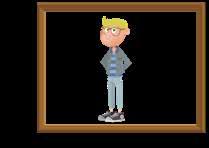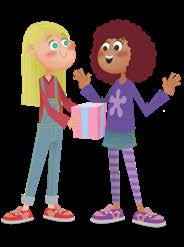o
en

o
en
“How wonderful to have such blessings! Yes, great blessings belong to those who have the Lord as their God” (Psalm 144:15, ERV).
1. Listen and read the article. Then choose the correct option to answer the question below.
What is the text mainly about?
a. The top ten happiest countries in the world.
Are you a happy person? What makes you happy? Do you know where the happiest people in the world live? Every year, the United Nations (UN) publishes the “World Happiness Report”, a document that contains a ranking of the happiest countries. The UN obtains the results by asking people of 156 countries questions that determine how happy they feel.
The survey measures people’s well-being, how they feel about their communities, their government and the freedom they enjoy.

According to this report, the winner is Finland, and this is not its first time! Finnish people ranked first twice in a row because they won the previous year, too! There are many factors that contribute to the happiness of the Finnish people, and it is interesting to see that money is not the most important of them. The government plays a vital role in contributing to its population’s well-being. Fighting corruption, improving basic public services and guaranteeing people’s personal freedom are some of the basic regular actions of the Finnish government system. Here is the list of the top ten happiest countries:

b. A description of Finland’s way of life.
c. A worldwide survey about happiness.
“I feel privileged”, says Leena, a 22-year-old woman who lives in Helsinki, the country’s capital. “I live in a country that is safe and where people are generous and care for one another. I travel to different countries five or six times a year, I am friendly, and I know people from many different parts of the world. I love visiting new places, but after some time away, I want to go back home. I miss my place and my people.”
Leena’s words summarize the feelings of a nation, a happy nation, or, as the report says: “The happiest nation in the world.”
2. Read the article on page 8 and write “T” (true), “F” (false) or “NM” (not mentioned).
a. The survey includes people from every country in the world.
b. The questions in the survey try to determine how happy people are.
c. Having money is very important to Finnish people.
d. The Finnish government focuses on three basic issues to contribute to its citizens’ well-being.
e. Leena has friends all over the world.
f. Being the happiest people of the world makes the Finnish people very proud.
3. Read the article again and answer the questions.
a. What does the UN survey measure?
b. What does “well-being” mean?
c. Where do the happiest citizens live?
d. What are the three issues the Finnish government focuses on?
4. Listen to Nina, Derek, Brooke and Thomas and complete the chart with the words in the box. Canada – Finland – Austria – New Zealand – travelling – playing sports – being with friends – living in Finland
What makes him/her happy
5. Rank the qualities below (1= the most important, to 6 = the least important). Then share and compare your ranking with a partner´s.
What makes people happy?

a. Being healthy.
b. Doing things for others.
c. Doing well at school/work.
d. Having a lot of money.
6. Pair work. Discuss the questions below.
a. Can you think of other qualities to add to the list in activity 5? Write them.
b. Does Leena look like a happy woman? Explain.
c. Are you a happy person? What makes you happy?
e. Having many friends.
f. Travelling.
1. Label the pictures with the words in the box. Then listen and check.
beard – braces – chubby – curly – freckles – glasses – long – short – short – slim – straight – tall

2. Read about Brad and choose the correct picture.
Joe, Camille, Peter and Beth are very excited. They’re waiting for a new classmate. His name’s Brad and he’s a foreign exchange student. He’s 13 years old and he comes from Liverpool, UK. Of course, they don’t know him, but they have a picture of him. He’s a short and slim boy with green eyes and blond hair. He wears glasses and he has freckles.
Other features
Useful tip!
Blue/brown/green/hazel eyes. Blond(e)/brown/black/grey/red hair.


3. Cross the odd one out.
a. She is chubby / straight hair / 14 years old

b. He has shor t / hazel eyes / a beard
c. She has freckles / thin / black hair


4. Pair work. Play “Guess who?”.
d. He wears glasses / dark clothes / tall

e. He has 15 years old / curly hair / braces
Useful tip!
To ask about someone’s look or appearance, say: What does (he) look like? He is short and chubby.




f. She’s tall /British / blond hair WB,
1. Match the personality adjectives to their definitions.
Someone…
a. Anxious
b. Brave
c. Friendly
d. Funny
e. Generous
f. Grumpy
g. Lazy
h. Optimistic
i. Pessimistic
j. Reliable
2. Put the adjectives in activity 1 in the correct column.
is not willing to work or make any effort. is courageous. is worried about something. acts or behaves in a way that you can trust. thinks that bad things will happen. is easily annoyed and bad-tempered. is happy to give or share (money, time, etc.). makes you laugh. believes that good things will happen. acts in a kind and pleasant way towards people.
To ask about someone’s personality traits say:
What’s (he) like?
He’s friendly.
Vocabulary Builder, p. 121
3. Describe the people in each sentence using a single word.
a. Mr. Maxwell always has time for people who need help. He sometimes gives them money, too. He’s generous
b. Every time I have a test, I can’t sleep well the previous night. I think about the test and get scared and nervous. I’m
c. My brother isn’t doing well at school. He’s very intelligent, but he never hands in homework. He’s
d. Our teacher makes jokes in class all the time. With her, we learn and have fun. She’s
e. My neighbour gets angry when my frisbee lands on his yard, or when my dog barks, or when I play noisily. He’s
f. I can trust my friends. They’re always with me, no matter what. They’re
g. My sister always looks on the bright side of everything. She’s
h. Tom loves doing extreme and risky sports, such as skydiving. He’s
4. Pair work. Describe your partner in three words. See if he/she agrees with you. Then swap roles.

1. Listen and complete the text with the words you hear.
Brad is an exchange student from the United Kingdom. He’s in year 7 and he (a) to school with Joe, David, Peter, Camille and Beth. He (b) his new school and his new friends, but he (c) the weather of the place. It’s too hot for him!
Brad has two sisters. They’re older than him. One of them doesn’t live with the family anymore. She (d) in Manchester.
Brad’s mum and dad usually (e) to different places, and their children go with them every time they can. When they (f) , they stay with their grandma and grandpa.
2. Read the dialogue and complete the sentences below.
David: Tell us more about your family, Brad.
We use the simple present to describe habits and routines. We add –(e)s to the verb when the subject is he/she/it. She often travels abroad.
To make the negative and questions, we use do/does She doesn’t get up early. Do they travel very often?
Grammar Reference, p. 113
Brad: My sisters are Maia and Emma. Maia is 19 and she studies at university, in Manchester. Emma is 16. She’s in year 9 at secondary school.
Camille: Do you and your sister like school here?
Brad: Yes, we do! But I sometimes miss my friends in the UK.
David: What do you usually do during weekends here?
Brad: I go roller-skating on Sunday mornings. In the afternoons my mum, my dad, Emma and I usually go to the lake and go kayaking. We love water sports.
a. Maia studies in Liverpool. Maia doesn’t study in Liverpool.
b. Brad misses his cousins. Brad his cousins.
c. Brad and his family love skiing. Brad and his family skiing.
3. Answer the questions about the dialogue:
a. Where does Maia study?
b. Do Brad and Emma like school here?
c. Who does Brad miss?
d. Brad and his family go to the park on Friday. Brad and his family to the park on Friday.
b. play
c. miss
4. Say it correctly!
d. What activity does Brad do on Sundays?
e. Does the family usually go kayaking?
f. Do they like water sports?
5. Circle the correct sound.
e. Brad and his family go to the lake on Sunday morning Brad and his family to the lake on Sunday morning. a. take
6. Pair work. Ask and answer about the activities you do at weekends.
1. Read the quiz and answer the questions about you. Useful tip!
a. How often do you make your bed in the morning?
Always Usually Sometimes Hardly ever Never
b. How often do you arrive at school late?
Always Usually Sometimes Hardly ever Never
c. How often do you and your family spend time together?
Always Usually Sometimes Hardly ever Never
d. How often do you chat with your friend in class?
Always Usually Sometimes Hardly ever Never
2. Look at the chart and complete the text next to it.
In my class there are (a) 30 students. (b) students never watch TV. (c) play computer games once a day and (d) play twice a week. The other 7 students (e) three times a month. Many students in my class do physical activity weekly. Sixteen students (f) twice a week. Only two students never (g)
3. Look at the chart again and write four more pieces of information.
Useful tip!
I always go to the gym. I am always happy.
I play tennis twice a month
4. Group work. Survey your class.
Instructions:
a. Choose three activities you know most of your classmates do.
b. In your notebook, create a chart like the one in activity 2.
c. Interview your classmates and complete the chart.
d. Present your findings to the class.
Grammar Reference, p. 113
1. Listen and complete the ideas. Use the words in the box.
swimming – travelling – learning – reading
a. The man is thinking about French.
b. The woman likes
c. during a storm is never a good idea.
d. by plane is safer than by train.
2. Match the two halves of the sentences.
a. He usually goes home from school is good exercise.
b. I have a new book. I love taking photos.
c. She’s interested in reading short stories.
d. Walking jogging in the morning.
3. Rephrase the sentences.
a. It is important to help people in need. Helping people in need is important.
b. It is easy to ride a bike.
c. It is wrong to lie.
d. It is necessary to finish the report today.
4. Complete the mini dialogues with gerunds. Use the prompts in the box. quit – rain – buy – work
a. Beth: I’m bored. What can I do?
Camille: When it stops we can go for a walk.
b. David: Why are you saving money?
Joe: I’m considering a new phone.
A gerund is a verb + -ing We use them:
1. As the subject of a sentence. Exercising is good for your health.
2. After some verbs. They go camping once a year.
3. After prepositions. I’m scared of failing
Grammar Reference, p. 113
Common verbs followed by gerunds: begin, stop, consider, continue, dislike, enjoy, imagine, keep, like, love, hate, try.
c. Peter: I can’t solve this! It’s very difficult. Teacher: Keep on You are doing it right.
d. Man: Do you like your job?
Woman: Not really. I usually think about
5. Complete the sentences writing about you. Use gerunds.
a. I’m scared of
b. I believe in
c. I’m tired of
d. I dream of
e. I’m considering
f. I never think about
6. Pair work. Ask each other about the information in activity 5.
A: What are you scared of?
B: I’m scared of drowning. And you?
1. Pair work. Discuss: What activities do you think most happy people have in common?
2. Read the article’s extract and check your predictions. Then underline the main idea of the text.
According to some surveys, happy people have many things in common. Researchers and psychologists from different parts of the world agree on the fact that happy people love travelling, spending a lot of quality time with friends and family and using their money to help others. Trusting God and praying are other characteristics that appeared frequently among survey respondents.
3. Listen to the interview and describe each person with one word in the box. There are extra words.
funny – generous – brave – optimistic – friendly
a. Jenna is
b. Sam is
4. Listen again and write “T” (true) or “F” (false). Correct the false statements.
a. When one of her classmates is sad, Jenna tells jokes.
b. Jenna tells her classmates to smile.
c. Focusing on the good things is what makes Sam happy.
5. Use the template below to write a text about you.
c. Polly is
d. Bad things never happen to Sam.
e. Polly usually gives money to build schools.
f. Polly always does volunteer work at the church.
This is me! My name is (name) and I’m (age). I’m happy the way I am. I’m (body type) and (body type). I have (hair) and (eyes). I have (other features) and I wear (other features). I think I’m (two or three positive characteristics about your personality), but there are some habits I need to change. For example, I’m (a negative characteristic). I (frequency expression + habitual action), and I (frequency expression + habitual action). I like (sport, hobby, etc.); and (thing) makes me happy.
6. Work in pairs. Ask and answer questions.
a. What do you look like?
b. What are you like?
c. What do you usually do after school?
d. What do you like doing?
e. How often do you like doing that?
f. What makes you happy?
“How wonderful to have such blessings! Yes, great blessings belong to those who have the Lord as their God” (Psalm 144:15, ERV).
1. Read the text and answer the question below. What is the text mainly about?
(1) For most people, feeling happy is a life goal.
(2) We all ask this question at some point in our lives. Some people think they can find happiness in material possessions. (3) But after some time, they feel empty again. Why? Because possessions and luxury do not last forever. Some people believe that happiness is having a good time. Unfortunately, when the good moment passes, they feel unhappy, sad or bored. And the cycle begins again: feeling happy is related to moments, to specific circumstances in a person’s life, but when something bad happens, this feeling disappears.
(4) We can find true happiness only in God. In the Bible there are a lot of verses that tell us that God wants us to be happy. As our Creator, God knows exactly what we need to have a happy life. He knows that by his side, we can find joy in life, (5) But more importantly,
he wants his children to live their lives in a way that will prepare them to enjoy eternity with him. Feeling happy and being happy are two different things. Remember: true happiness comes from God, our Lord and Creator. (6)

2. Insert these missing sentences or clauses in the text above. Write a-f in the correct gaps.
a. “What do we need to be happy?”
b. They buy the latest smar tphone or the most expensive clothes.

c. even when bad things occur.
d. What is the source of true happiness, then?
e. Give praise to him and take pleasure in all his blessings.
f. Everybody wants to be happy.
3. Look at the list of things that can make a person happy. Write “H” (human happiness) or “G” (Godly happiness).
a. Having the latest phone.
b. Praying.
c. Being good at something.
d. Thinking about Heaven.
e. Winning prizes or awards.
f. Helping people in need.
g. Telling people about Jesus.
h. Going on holidays once a year.
4. Pair work. Compare your answers to those of a partner. Comment on your choices.
1. Complete the descriptions of people’s appearance.
straight – glasses – eyes – hair – chubby – slim
a. Camille has long
b. She can’t see well. She wears
c. Peter is and tall.
d. Babies are . Their round faces are adorable!
e. I don’t like my curls! I like hair!
f. My mum has hazel
2. Complete the description of people’s personality traits.
grumpy – lazy – brave – pessimistic – funny – friendly
a. He practises extreme spor ts. He’s
b. Change your attitude! Don’t be
c. people don’t enjoy life. They only focus on bad things.
d. She has so many friends. She’s
e. Don’t be ! Help me wash the car!
f. He always tells jokes. He’s so
3. Complete the dialogue about habits and routine.
Joe: Do you want to come to the Green Planet Club after school?
Brad: I’m sorry, but I (a) (have) Spanish lessons on Mondays.
Joe: What about tomorrow? Your sister can come, too!
Brad: That’s great. I (b) (not want) to miss it, but my sister (c) (go) to the gym on Tuesdays. Maybe next time.
Joe: OK. We (d) (do) many interesting activities there. The teacher is great and he always (e) (teach) us things in very creative ways.
4. Unjumble the sentences that talk about frequency
a. always / they / on time / arrive
b. I / watch / never / horror movies
c. go on / twice a year / we / a field trip
d. the hairdresser’s / once a month / my mum / goes to
5. Complete the sentences with the gerund form of the verbs in the box.
do – fail – hang – make – study – treck
a. I’m interested in robotics.
b. It’s OK. Try it again.
c. Stop noise. The kids are asleep.
d. out with my friends is great!
e. She’s afraid of the exam.
f. is my favourite activity.
6. Match the questions to the answers.
a. What does your brother look like?
b. What is your mother like?
c. What does your father like doing in his free time?
d. How often do you go to the park?
e. What makes you happy?
Spending time with my family and friends makes me happy. He’s tall and slim. He has short hair and green eyes. He likes reading a book or watching a film. She’s kind and generous. I usually go there once a week.
7. Complete the dialogue. Write the questions.
A:
B: I’m chubby.
A:
B: I’m an optimistic person.
A:
My progress: I can...
Describe people’s appearance.
Describe people’s personality traits.
Describe myself.
Talk about people’s habits and routines.
Talk about frequency. Use gerunds.
Worksheet 1